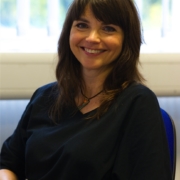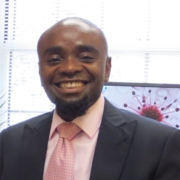Can You Hear the Subaltern Speak?
Bhavani Kunjulakshmi
 Today we air the next episode of Flux. This episode was created by Bhavani Kunjulakshmi, a recent graduate of the UCL Institute of Education and staff writer at Feminism in India. Bhavani’s episode explores the meaning of colonization and decolonization in international development and education. We might think we know what colonization is. The history. The actors involved. The exploitation. But what does it feel like? And then what would it mean to decolonize? And what would that feel like? Bhavani explores these questions.
Today we air the next episode of Flux. This episode was created by Bhavani Kunjulakshmi, a recent graduate of the UCL Institute of Education and staff writer at Feminism in India. Bhavani’s episode explores the meaning of colonization and decolonization in international development and education. We might think we know what colonization is. The history. The actors involved. The exploitation. But what does it feel like? And then what would it mean to decolonize? And what would that feel like? Bhavani explores these questions.
—
This episode was created, written, produced and edited by Bhavani Kunjulakshmi.
Johannah Fahey was the executive producer.
Brett Lashua and Will Brehm were the producers.
Voices:
Laila Kadiwal
The bell hooks’ clip was a part of ‘A Public Dialogue between bell hooks & Laverne Cox hosted by Eugene Lang College of Liberal Arts’ (Creative commons)
Fred Brehm read the quote by Noah Chomsky and Fran Vavrus read the quote by Martha Nussbaum.
The clip of Amartya Sen was a part of ‘Equality and growth – an interview with Amartya Sen’ (Creative commons)
Quote by Noam Chomsky about Kerala was from Pedagogy of the Oppressed: Noam Chomsky, Howard Gardner, and Bruno della Chiesa Askwith Forum (Creative commons)
Quotes by Martha Nussbaum was from “Creating Capabilities: The Human Development Approach” (Creative commons)
Music: The Spirituals Project – Sankofa – Oh Freedom (Creative commons)
Additional music was composed by M.C Couper
Bhavani:
I can’t tell the full story in this half an hour podcast. It makes me very angry and I feel my shoulders tighten up because hm.. I feel like a lot remains unsaid. hm.. Yeah.
bell hooks:
I always like to pretend that I’m up in heaven and…you know? God is asking me, well, bell, what is it that you like the most? and I would always answer that what I most wanted for myself was to be able to be free, to be self-loving… to all those things and that life has allowed me to have that is a tremendous gift.. and the tremendous need to share with others
Bhavani:
Recalling the life that I had left behind in Kerala… I’m a little ashamed to admit this but growing up, there was definitely a time when I actually dreamt of having an arranged marriage. I mean… I bought what was sold to me! Around me I didn’t see a different model. There wasn’t a woman who was dating or at least openly dating…I…..I did hear about the ones who eloped with men and brought shame to their families but it was terrifying to even imagine being one of them. So, I thought an arranged marriage was THE future for me. And of course, my mother taught us that it would be up to my future husband to decide how long I would continue studying or if I would “be allowed” to work. So, I didn’t want to plan anything until I met my husband at eighteen because he would then make all my decisions for me anyway. So, what’s really the point of planning? I also remember when this narrative began to change in my mind. I woke up one morning. I was around nine years old at the time. I was the last one to wake up and I went into the living room where my father and my uncle were sitting at the dining table, sipping tea. The women in the family… my mother, my aunts-they were just standing around the table, perhaps ready to rush to the kitchen on command and they were discussing…I mean, the menwere discussing my sister’s arranged marriage, and the specifics of the next steps. I mean…the women were also contributing to the discussion, definitely not with strong opinions but just comments, mostly just agreeing with the men and…I stood there wondering…… why my sister wasn’t there. Also, I couldn’t help but worry that in nine years time when I turned 18, would they be having the same conversation about whom I would be marrying without me even being in that room? Would I also be marrying a stranger? Could I even imagine what that person might be like? I mean, would that even matter? Because all that would matter would be whoever my father had in mind. All that would matter would be what my uncle, my mother, and maybe the ‘brokers’ could imagine. So, we have marriage brokers’. You know? They are very similar to real estate brokers. These brokers would be approached by men or their parents. The broker would understand their demands and needs, their checklist of requirements for what their bride must be like. Then the brokers would start looking for a suitable proposal or a quotation that matches their specific set of requirements. Caste? Check! Family reputation? Check! Skin color? Check! Cooking skills? Check!The length of her hair? Check! Purity? Check! Height? Check! Education? Check! Weight? Check! Family’s wealth? Check! Age? Check!
Bhavani:
But that’s not how Kerala is understood by supposedly-progressive academics. The standard story heard in Western Universities is of how Kerala is great for women. It’s all about the Kerala model of development.
Martha Nussbaum:
Kerala is a very interesting case. A southern Indian state which has very good educational achievements. 99% literacy among adolescents for both boys and girls as against a background of 65% male literacy and 50% female literacy in the nation as a whole- so stunningly above the national average. And in health too, it’s stunningly above the national average. It has the same health data as Harlem in New York. Now that’s bad for New York, but it’s quite good for a poor Indian state and much better, again, than the national average. So, Kerala did that without actually having much economic growth, because its economic policies have been a failure.
Noam Chomsky:
So, take India. I don’t know how many of you know anything about India but there’s one poor, relatively poor, state in India, Kerala, which has an extremely high level of literacy specifically and education generally. And incidentally of women’s education and that’s the reason why fertility goes straight down. It’s been a consequence of women’s education that you get and so women’s control of what they can do that literacy that fertility that goes way down. It’s a very poor place and if you visit it, you see it. It’s the one part of India where you can kind of drive around and see people sitting at a little bar or something, sitting outside reading newspapers and talking to each other and so on.
Amartya Sen:
In Kerala there are two factors that explain all the difference pretty much all the difference: women literacy and education and women’s gainful employment in earning an income from outside. Each of which increased the voice of women and their agency in family affairs. And no one’s lives are as much affected as that of young women from over frequent rearing and bearing of children. And if they had more [choice?]. Fertility rate dramatically comes down so I think there is that agency issue and where there’s also evidence that women’s education reduces child mortality we do so gender discrimination between boys and girls and so on.
Bhavani:
This is what my University in London tried to teach me. So, Martha Nussbaum, Noam Chomsky and Amartya Sen are the experts on Kerala women. I think narrating is what’s making it difficult. I feel powerless when I re-live everything. hm… maybe poetry might bring a safe distance between my experiences and how I’m feeling and I can do spoken word without having to explain my feelings.
Archana. Vismaya. Mofiya. Uthra. Rifa.The names of Kerala women who lost their lives
to dowry harassment in the last few months! The names of Kerala who died because of dowry in the last few months. But to Chomsky, Nussbaum and Sen- women in Kerala are literate! Women in Kerala are educated! Women in Kerala have a low fertility rate. So, what’s the problem? Archana was educated. Vismaya was educated. Mofiya was educated. Uthra was educated. Rifa was educated. So, how do you explain what happened to them? BUT Kerala is the utopia of gender equality in the global South! because a Brahmin man like Sen can agree with white people, because Brahmanism and whiteness have always joined arms to oppress us, to colonize us, to speak on behalf of us, to shout over our truth, to distort our sense of self, to define who we are as Subaltern women. Do they even know that the primary motivation for girls’ education in Kerala is hypergamy? Do they even know that the low fertility rate is because 90% of Kerala’s married women get sterilized after giving birth. Do they know that women in Kerala are giving birth to the number of children desired by the husband?
bell hooks:
having awareness of the need to decolonize and at the same time working within a very colonizing system.
Bhavani:
They ask me- Why do you talk about decolonization? Why do you, an Ezhava woman, talk about decolonization? Ezhava is my caste. Do you want to go back to the time before the British colonialism? Do you want to go back to the time when Ezhava women like you were enslaved? Do you want to go back to the time when Ezhava women like you were untouchables? Do you want to go back to the time when Ezhava women like you did not have the right to cover their breasts? Do you want to go back to the time when Ezhava women like you had to pay taxes for their breasts? Do you want to go back to the time when Ezhava women like you were not even allowed into schools? Hypocrite. Call me a hypocrite. Call me a hypocrite for being a student at an Elite university in the UK. Call me a hypocrite for being a student at my colonizer’s university that erases and writes over my history. Of course, my colonizer’s university teaches my oppressor’s version of reality. Why am I here? If I am to decolonize gender, my gender, a subaltern queer woman from Kerala’s gender, why am I here? Why am I a student at a department that was once called the Colonial Department? Why am I a student at a department that was set in place to educate the quote unquote primitives? Primitives. That’s what they called people like me -the primitives. Why am I in a department that was set in place to teach us who are, so we could be psychologically dominated and colonized? Call me a hypocrite. Call me a hypocrite and I dearly wish we could leave it at that. That would have been it if the colonial project was not alive. That would have been it if the university was only teaching a handful of students. That would have been it if colonialism was not playing dress up, wearing the costume of international development. But they are teaching their version of the history and who we are to the entire world. They are teaching their version of the history and who we are to the young colonizers. They are teaching their version of the history and who we are to us, to us, to the colonized. Well, let’s not call it their ‘version’ of the history. Their version of the history implies there are multiple versions of history. Like the colonizers’ version of history might be as truthful and valid as our version of history. We’re not here to take a piece of that cake. We can’t eat a cake stained with our ancestors’ blood. We can’t eat a cake stained with our blood. We can’t eat a cake stained with our children’s blood. Call us hypocrites. The other is not here to be shamed into silence. The other is not here to be tamed into submission. The other is not here to assimilate. The other is here to replace the books in the colonizer’s library. We are here. Call us hypocrites.
Bhavani:
and then….I would go on to talk about the British and this is exactly what they are doing now and it’s just called international development. Yeah Laila, let me know what you think and I would love to know. I would like to add something that you would..you would want people to hear.
Laila Kadiwal:
Thanks for your powerful poem. It essentially refers to the issue of epistemic violence. The dominant stories in the West in India are white savarna or what I call, white upper caste stories. White savarna storytellers have their own criteria, needs and priorities. We do not hear the stories or critical scholarship of people from historically marginalized and caste-oppressed backgrounds. Their voices remain silenced through violence and ideological dominance. On the other hand, the white savarna lens dominates through reward structures- awards, funding and research collaboration. I find it intellectually dishonest when I see savarna upper-caste scholars use the discourse of exclusion but maintain silence over the issue of casteism and caste privileges when they talk about India. This tendency is the same as white scholars who ignore the ongoing patterns of coloniality and see globalized forms of structural racism. You see, people do not question the identities that give them power. This tendency is very pervasive in the field of international development; it does not consider its historical and epistemic location instead it assumes a universal voice. I understand your anger. You find yourself erased through their authoritative narrative. I find it offensive when I hear the white savarna scholars pretending to give voice to the voiceless. They hold this myth that Subalterns do not speak and so the white savanna savior is required to speak on marginalized people’s behalf. This is internalized casteism and racism. There is an investment in feeling good and looking good, rather than asking how did the mic land in your hand in the first place. They do not unpack the deeper histories of exploitation. They do not consider reparatory actions that critical anti-race and anti-caste scholars have been asking for decades. They have not been listening. Spivak once famously asked, “Can the subaltern speak?” I think it’s the wrong question. We must ask, can you hear the subaltern speak? Are you willing to pass the mic? Instead of centering yourself as the authors of marginalized people’s stories? Are you willing to de-centre yourself epistemically? Are you willing to prioritize reparations?
bell hooks:
I mean, I got tired of academe. I felt like academe was so much like the dysfunctional family. That if I stayed in it, in the way that I was in it, I would never be well. Because all of the ingredients of the dysfunctional family were present there.
Bhavani:
That was bell hooks. A part of me thinks we haven’t really lost her and we never will. She lives on, healing us and she lives through us and her work will live on even after our time. The voice you heard before, that was Laila Kadiwal. Laila is a brilliant scholar and activist. She’s been my mentor for the last two years and at university, she’s been a support system for many people like me and this is really important because there aren’t many people like Laila who stand on their truth without safely taking the side of authority. And to add a few words about how it went down
when I spoke about this to the university. I mean this audacity to write and tell our story after having also told the stories of our great grandmothers and grandmothers. But the moment you call it out, you become the problem. So, when I raised this as a complaint which as you can imagine, it’s not easy being a student. I knew they were going to tone police me anyway. That’s bound to happen when you submit a complaint about and at an institution, to the institution that holds power. And the response was disappointing yet not surprising because it’s the same pattern they follow. This is how they do it. They will not address the complaint, instead they would pathologize the complainee and intellectualize their misuse of power. They would blame it on the trauma of the oppressed and they would escape accountability, which is quite sick because what it shows is the inability to reflect, the inability to do self-enquiry, the inability to accept when one is wrong and I think this is the tragedy of people in positions of power and institutions of power. Their privilege affords them a life that doesn’t require looking at the mirror. So, as soon as a mirror is held up against them by the people they are oppressing, they want to break it. So, like a child throwing tantrums, they try to break the complainee. It’s transparent and childish.
Laila Kadiwal:
Can you hear the subaltern speak? Are you willing to pass the mic? Instead of centering yourself, as the authors of marginalized people’s stories? Are you willing to de-centre yourself epistemically? Are you willing to prioritize reparations?
Bhavani:
I remember the days leading up to my sister’s wedding. I felt surprised day after day with what I was witnessing and discovering. My sister… She didn’t seem to resist and… I would say she even seemed excited. I wondered if she was just excited because she would no longer be controlled by our parents, who, until that point, decided everything for her. They didn’t let her stay out to meet friends outside of school, they controlled who she spoke to, they decided what she wore. My parents controlled her so that she won’t bring any shame to the family, so that her purity could be preserved, so that she would have value in the market of arranged marriage, so that families with sons would want to make an alliance with our family, so that the broker won’t have to work too hard to find her a man, so that the family’s honor will not be tainted, so that my mother could be the dutiful woman who raised her daughters to have no opinions, so that my father could be the manly man who knows how to discipline the women in his family. I think she believed that marrying a stranger would set her free. I think there was a time when I also believed that marrying a stranger is what would set me free. But then I also heard how the older women in the family advised the new bride about being hit or being battered by their new husband as the necessary taming of a woman who needs to learn her place or who needs to be taught her place. So, I saw it as my future already decided for me but I wondered if I would also obey and submit like my sister did because not even the women in my family would understand why I wouldn’t.
Bhavani:
In the weeks leading up to my sister’s wedding, I also caught up with these cryptic mentions of marital sex as something that’s offered by a wife to her husband, on his demand and.. In the years that followed, I wondered if some young women did not protest arranged marriage because it would indeed be a relief to experience this kind of a physical intimacy without the guilt, the shame and the stigma attached to ‘anything’ pre-marital? Without having to hide having sex? We go through our teenage years imagining what it would be like to not have to watch over our shoulders…just to hold hands with somebody..Or to be with a person because all that was not ‘allowed’ since that’s how you bring shame to the family and taint the reputation forever. So, no one really called them ‘forced’ arranged marriages even though there were clear signs of coercion and physical abuse. I remember how my mother proudly declared. The ways in which she offered a model for her daughters…cooking, cleaning, washing and serving her husband day in and day out. The groom’s family was often referred to as the bride’s ‘future family’.. So ‘Obey them. Be nice to them. Do not ever come back complaining about them. It was quite clearly established that any instances of domestic violence would be seen as the violence provoked by the woman who possibly arrogantly flaunted her agency and deserved to be hit by her husband who was simply teaching her a lesson.
Bhavani:
I’m not telling this story so someone could come and rescue us. I’m telling this story so you understand how colonialism continues to tango with casteism. We didn’t really have arranged marriages or even monogamy until three generations ago. When I say we, I mean, people from my caste and several other communities in Kerala. My caste is Ezhava. We are one of the polluted castes. About 2,000 years ago, the Brahmins colonized us. They introduced the caste system. The Brahmins of Kerala are called Namboodiris. The Namboodiris became our teachers, our priests and historians who taught us to see ourselves through their eyes…And in their eyes, under the eyes of the caste system, we became one of those castes that you might know of as the untouchables. We were farmers and toddy tappers…as in..we made palm wine. We were enslaved until the early 1800’s. In 1813, The Ezhava women…together with Pulaya, Paraya and other Dalit women. They even started organizing and revolting for the right to cover their breasts. This revolt eventually became the Reformation Movement. A movement that was against the caste system and feudalism. Nangeli, an Ezhava woman-she cut off her breasts and she submitted it to the tax collector… and this led to the abolition of Breast Tax yet she’s not taught to us as a reformer because reformers are all men.
Bhavani:
We always had women like Nangeli but the British liked to think that THEY rescued us from caste oppression. They had already arrived in the region by 1583. Kerala at the time consisted of the princely states of Travancore and Cochin and Malabar coast. At the time we didn’t really have the institution of marriage in our caste. It was common for Ezhava women to have multiple partners. By the mid-late 1800’s, the British began to intervene and they said we could cover our breasts and enter schools if we converted to Christianity. So, a lot of us converted to Christianity and the rest of us assimilated into Englishness because it came with the possibility of education and employment and we would no longer have to work for the feudal landlords! The British tricked us into thinking that Victorian morality would emancipate us from Brahmanical patriarchy and by Victorian morality I mean, attaching women’s worth to chastity, having an arranged marriage, the father of the bride paying dowry to the groom, the wife moving into the husband’s family, the notion of housewives and providing husbands. They also made it seem like if women spoke English it meant they’re emancipated. So, the British civilizing mission, in a way, co-opted our anti-caste movement and they also gave us this illusion of caste mobility but all we really got was the right to imitate the Brahmin patriarchy and Victorian patriarchy.
Bhavani:
I feel a certain kind of pressure to say everything about the history of women from my caste, because our history has been lied about for so long. That is a lot of rage, and grief and powerlessness. Our history has been lied about and manipulated and distorted for so long. And it has such a direct impact on the way, the ways in which we see our sense of self. The namboodiris, the menons, and the nairs, the upper caste, they did that to us, they continue to do that to us. The British missionaries did that to us when they first arrived, and the education system that they set in place..did that to us. The ways in which that education system continues to be what educates us. Even though we are technically politically independent, it does that to us. It continues to distort our history. There’s a part of me that wants to go on a roof and scream this to the world. And I say “world” and I do not say just people in Kerala because white researchers, historians, writers, movie makers, they continue to study us like we are some insects in a laboratory, and write about us and tell our story, tell our history, and they continue to distort it actively. And we continue to listen to them. And I think for me that’s really the most heartbreaking part is that we continue to listen to them. We continue to listen to the oppressor to find out our past and our present hm.. Yeah,
Laila Kadiwal:
Can you hear the subaltern speak? Are you willing to pass the mic? Instead of centering yourself, as the authors of marginalized people’s stories? Are you willing to de-centre yourself epistemically? Are you willing to prioritize reparations?
Bhavani:
Sometimes I wonder why they try so hard to silence us. To pathologize our pain and anger. How self-resenting does one need to be in order to want to do that in order to seek sadistic pleasure by inflicting such violence? But when we refuse to be silent, when we tell our stories, we realize how many of us are out there and we see our power. We realize how little and silly the oppressors are. We get to love, heal and laugh together. I’m grateful to know several women who refuse to be buried and refuse to be infantilized. From them, I learn other ways of living…and being…The other audacious women who could not and cannot be silenced. The ones who refuse to contain their rage. They insist that we can find our community by doing just that, by refusing And So … I listen to them.
bell hooks:
I always like to pretend that I’m up in heaven you know? God is asking me, well, bell, what was it that you liked the most? and I would always answer that what I most wanted for myself was to be able to be free
Want to help translate this show? Please contact info@freshedpodcast.com
Author Publications
Reading Bridgerton Season 2 in the Context of Kerala’s Reformation Movement
Recommended Resources
Gender and Development
Women and Human Development – Martha Nussbaum
Amartya Sen – The Concept of Development
The “New” Kerala Model of Development: Lessons for Sustainable Development
Human Capital Attainment and Gender Empowerment: The Kerala Paradox
“Modern Slavery” and Forced Marriage
Female Sterilization in Kerala is Touted as Empowering Women
The Horrors of Kerala’s Dowry Deaths
Gender, Caste, and Matchmaking in Kerala: A Rationale for Dowry
Domestic Violence, Dowry: Does Kerala Merit its ‘Progressive’ Tag?
Violence Against Women and Children in Kerala
Bounding the Causal Effect of Hypergamy Violation on Domestic Violence in India
Legacies of Matriliny: The Place of Women and the “Kerala Model”
Subaltern Modernities: Kerala, the Eastern Theatre of Resistance in the Global South
Subaltern Politics, Justice, and Nature in Postcolonial India
Dalit Women’s Agency, Channar Lahala, and Kerala Renaissance
Dalit Women’s Empowerment Struggles in Pre-Independent Kerala
Dalit Women: Honour and Patriarchy in South India
Dalit Visions: The Anti-cast Movement and the Construction of an Indian Identity
The Enigma of the Kerala Woman
The Dalit Liberation Movement in Colonial Period
Linking Radical Traditions and Contemporary Dalit Women’s Movement
The Izhavas of Kerala and their Struggle for Acceptance in the Hindy Society
The Woman Who Cut off Her Breasts
Celebrating Fiery Dalit Icons on Women’s Day
Social Identity, Law, Gendered Identity Among Ezhavas in Travancore
Women’s Labour, Patriarchy and Feminism in Twenty-First-Century Kerala
Theorizing Patriarchy: Development Paradoxes and the Geography of Gender in South Asia
Consolidation of Patriarchy in Kerala, a Consequence of British Colonial Influence
Persisting Patriarchy: Intersectionalities, Negotiations, Subversions
Caste System
The Making of the Brown “Savior”: Race, Caste, Class, and India’s (Global) Help Economy
Dark Look: Sensory Contours of Racism in India
Critical Caste Theory in Education
Caste, Public Action and the Kerala Model
Historic Legacy of Caste Enslavement: A Case of Reparative Justice
India: The Context of its Current Internal Colonialism
Casteism, Colonization, and Colorism
Foundations of Anti-caste Consciousness
Related Novels
Have any useful resources related to this show? Please send them to info@freshedpodcast.com









